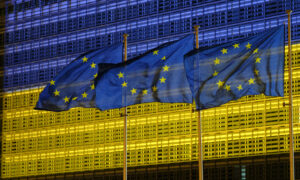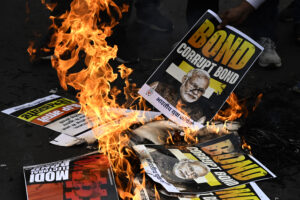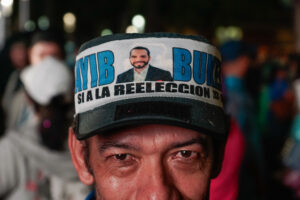
July 2007, Volume 18, Issue 3
When Will the Chinese People Be Free?
Rising levels of wealth and schooling make it highly likely that China will be a "Partly Free" country by 2015 and a "Free" one ten years after that.

July 2007, Volume 18, Issue 3
Rising levels of wealth and schooling make it highly likely that China will be a "Partly Free" country by 2015 and a "Free" one ten years after that.
April 2007, Volume 18, Issue 2
Pervasive corruption hampers India's democracy, yet anticorruption movements may be helping to improve governmental accountability.

April 2007, Volume 18, Issue 2
The Putin regime is plunging Russia into a deepening crisis. It is time to end the fiction that today's Russia is a democracy.

July 2006, Volume 17, Issue 3
Successfully fighting corruption in developing and postcommunist countries requires far more than instituting best practices from advanced democracies. Corruption first must be properly diagnosed; in some cases it can be effectively treated only by attacking the distribution of power itself.

January 2006, Volume 17, Issue 1
Taking advantage of the withdrawal of Syrian troops, Lebanese voters capped the "Beirut Spring" by electing a new majority in parliament.
January 2006, Volume 17, Issue 1
The successful completion of yet another general election should dispel any residual doubts about Bulgarian democracy. But the election results made clear that the country now faces a new set of challenges.
January 2006, Volume 17, Issue 1
Vladimir Putin has pulled the plug on democracy in Russia in an effort to strengthen the authority of the central state. But a look at Russian federal relations shows that the state is growing weaker rather than stronger.
January 2006, Volume 17, Issue 1
Measurements that rely on perceptions of corruption can be misleading. What is needed is a method of gauging how well a country has set itself up to defend public integrity systematically and in all its dimensions.
October 2005, Volume 16, Issue 4
From hurricanes to ethnic and political tensions, the past decade has not been easy for the countries of the Caribbean Community. What does the future hold for these small democracies?
July 2005, Volume 16, Issue 3
Natural-resource wealth has been at the root of Angola's corruption and authoritarianism. By giving leverage to those pushing for reform, however, it has also become a key factor in teh struggle for accountability.
April 2005, Volume 16, Issue 2
Despite the tsunami tragedy, Indonesians at least can look back on the political events of 2004 with pride. Their country successfully held three major elections and produced a legitimate government. Now the main challenge is to secure regular governmental accountability.
April 2005, Volume 16, Issue 2
This report is by Alina Mungiu-Pippidi, president of the Romanian Academic Society, who heads the Coalition for a Clean Parliament.
January 2005, Volume 16, Issue 1
Modest progress in the muslim-majority countries is complemented by mass mobilization for democracy and freedom in Ukraine. Meanwhile, Russia ranks as Not Free for the first time since the fall of communism.
July 2004, Volume 15, Issue 3
Russia's liberal-democratic parties have failed. It is time for a new movement that can gain the trust of the Russian people by putting forward a full reform program based on liberal and democratic principles.
April 2004, Volume 15, Issue 2
Uganda’a move to a multiparty system is really a maneuver by President Yoweri Museveni to prolong his stay in power beyond the two-term limit mandated by the constitution.
January 2004, Volume 15, Issue 1
Despite the threats posed by terrorism, 2003 saw a second consecutive year of significant momentum of freedom, and showed encouraging evidence that political rights and civil liberties can endure despite economic privation.
January 2004, Volume 15, Issue 1
For this huge, sprawling nation in the throes of an ambiguous transition, 2004 will be a year replete with unprecedented electoral tests. In the end, leadership and results will probably count for more than rules and institutions, however carefully designed.
January 2004, Volume 15, Issue 1
A review of Popular Choice and Managed Democracy: The Russian Elections of 1999 and 2000 by Timothy J. Colton and Michael McFaul; Darkness at Dawn: The Rise of the Russian Criminal State by David Satter; and Putin's Russia by Lilia Shevtsova.
July 2003, Volume 14, Issue 3
Gauging electoral competitiveness relative to economic development reveals not only that Arab countries “underperform” but, strikingly, that non-Arab Muslim-majority countries tend to “overperform.”
July 2003, Volume 14, Issue 3
Liberty and self-government are not only good in themselves, but also have powerful and beneficial effects on a nation’s level of economic development and prosperity.
July 2003, Volume 14, Issue 3
New data covering most of the 1990s reveal that democracy, even when minimally defined, has a potent independent impact that tends to reduce infant mortality and promote overall social well-being.
July 2003, Volume 14, Issue 3
Almost a half-century after being forced from their homeland, Tibetans abroad, led by the Dalai Lama, have democratized their institutions in hopes that they may one day form the basis for a free and self-governing Tibet.
July 2003, Volume 14, Issue 3
The election cycle concluding in the spring of 2003 was a guarded success. High hurdles to better governance and democratic consolidation remain, but Nigerians can now face them with greater hope.
July 2003, Volume 14, Issue 3
After falling short in 1992 and 1997, Kenya’s large but fractious opposition coalition swept to victory at the polls in 2002. Transition has arrived, but can democratic transformation follow?
July 2003, Volume 14, Issue 3
Democratic and ecnomic development will become sustainable in sub-Saharan Africa only with the emergence of coherent, legitimate and effective states.
July 2003, Volume 14, Issue 3
A review of "Ending Civil Wars: The Implementation of Peace Agreements" Edited by Stephen John Stedman, Donald Rothchild, and Elizabeth M. Cousens.
October 2002, Volume 13, Issue 4
Realizing that power would slip from his grasp if he allowed an honest presidential election in 2002, longtime strongman Robert Mugabe resorted to antidemocratic tactics that set a new low in cruelty and dishonesty.
October 2002, Volume 13, Issue 4
During the 1990s, politics in the small post-Soviet state of Moldova was more competitive than anyone would have expected. Yet there was less to this surprising pluralism than met the eye.
October 2002, Volume 13, Issue 4
The Gambia provides a lesson in how authoritarians can hold votes yet rob their people of the power that the ballot box is supposed to give them.
January 2002, Volume 13, Issue 1
The United Nations did superb work in helping Mozambique to end its long-festering civil war and start down the path to recovery, but those gains could slip away amid ominous conditions of partisan polarization, excessive political centralization, and a winner-takes-everything electoral system.
October 2001, Volume 12, Issue 4
The failures of post-Soviet reform notwithstanding, serious strides have been made toward economic and political transformation.
October 2001, Volume 12, Issue 4
Ukraine has secured its independence, but remains troubled by slow growth, corruption, and an overly strong presidency.
October 2001, Volume 12, Issue 4
In Russia, formally democratic institutions coexist uneasily with the reality of tightly consolidated bureaucratic and executive power.
April 2001, Volume 12, Issue 2
The conventional wisdom about Venezuela’s plight is largely mistaken. Only when Venezuelans recognize the real causes of their woes will they be able to make progress in overcoming them.
April 2001, Volume 12, Issue 2
The sudden and surprising downfall of President Alberto Fujimori has opened the way for a return to democracy in Peru, but the country’s new leaders will face major challenges in the coming years.
January 2001, Volume 12, Issue 1
The military regime of General Musharraf has been less repressive than many had feared, but there is little sign that it is overcoming the deep-seated problems that led to the failure of Pakistani democracy.
January 2001, Volume 12, Issue 1
The astonishing electoral victories by opposition presidential candidates in Korea, Taiwan, and Mexico all followed a remarkably similar pattern, but it is one that may lead to difficulties for democratic consolidation.
January 2001, Volume 12, Issue 1
Citizens of postcommunist countries not only want to be free to say what they think and to vote their conscience; they also want a government that obeys the rules it lays down and is not steeped in corruption.
October 2000, Volume 11, Issue 4
Vicente Fox’s victory in Mexico’s July 2000 presidential election revealed the fundamental changes that had been taking place under the veil of governmental continuity.
October 2000, Volume 11, Issue 4
The beauty of Mexico’s transition to democracy lay in the way it evolved gradually and peacefully over the course of a decade.
October 2000, Volume 11, Issue 4
An Egyptian civil-society leader responds to the closing down of his organization and the allegations against him by state prosecutors.
October 2000, Volume 11, Issue 4
Such a comparison clearly shows a higher prevalence of democracy in Latin America and a better economic performance in East Asia. The two regions are likely to converge on both dimensions, but the gaps will remain.
October 2000, Volume 11, Issue 4
Four excerpts from the Iranian press-on elections and democracy and on religious intolerance and intellectual pluralism-suggest the extent to which democratic thinking has gained a foothold in Iran.
October 2000, Volume 11, Issue 4
Recent studies of democracy in Latin America overlook the role of civil society as an agent of accountability.
October 2000, Volume 11, Issue 4
A nongovernmental organization, Citizens Organized to Monitor Voting (GONG), helped ensure the transparency of Croatia’s recent elections.
July 2000, Volume 11, Issue 3
The analogy with feudalism helps us understand the baffling changes that unexpectedly appeared during the transition away from communist rule.
July 2000, Volume 11, Issue 3
Democracy is spreading everywhere except in the Arab world. Arab elections are an immense masquerade. Corrupt dictatorships seek to stifle freedom of thought and to control the flow of information.
July 2000, Volume 11, Issue 3
Many observers regarded 1999 as a year of progress for democracy in the Arab world. There is reason to doubt, however, whether any meaningful change has really occurred.
July 2000, Volume 11, Issue 3
The (Un)Rule of Law and the Underprivileged in Latin America, edited by Juan E. Méndez, Guillermo O’Donnell, and Paulo Sérgio Pinheiro, offers a harsh appraisal of the region’s legal and justice systems.
April 2000, Volume 11, Issue 2
The political dimensions of the 1997-99 Asian financial crisis have been largely ignored. Yet political factors are crucial to understanding the crisis and the differing ways in which the democracies and authoritarian regimes in the region responded to it.
April 1999, Volume 10, Issue 2
Read the full essay here.
October 1997, Volume 8, Issue 4
Read the full essay here.
April 1995, Volume 6, Issue 2
Read the full essay here.
Fall 1991, Volume 2, Issue 4
The Editors’ introduction to “Political Corruption.”
Fall 1991, Volume 2, Issue 4
Read the full essay here.
Fall 1991, Volume 2, Issue 4
Read the full essay here.
Fall 1991, Volume 2, Issue 4
Read the full essay here.
Winter 1990, Volume 1, Issue 1
Over the past several years, the world has come to see the crisis in Panama mainly as a confrontation between the United States and Panama's military strongman, General Manuel Antonio Noriega. But this perception – reinforced lately by press reports on last October's failed coup attempt – is badly mistaken.

Despite the country’s steady progress fighting corruption, even in wartime, skeptics warn it’s not enough. But this is just an excuse. Their real concern is how Putin’s Russia would respond.

“Electoral bonds” were supposed to make political contributions transparent. Instead they became a form of legalized corruption, funneling huge sums and making the political playing field even more uneven.

Of course not. But the region’s democratic hopes are fighting an uphill battle against corruption, crime, and a violent past.

Alexei Navalny was one of the bravest and most influential political leaders of our time. His assassination should be a wake-up call for Western democracies.